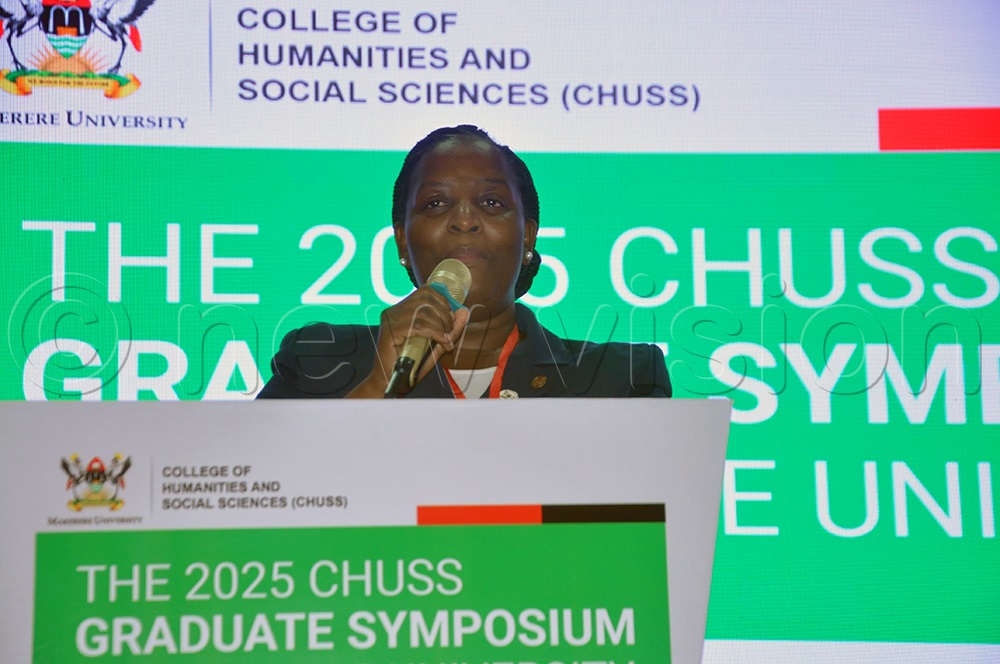Makerere PhD students urged to pursue research that benefits society
“Research that lacks relevance is a waste of resources,” Mukadasi cautioned. “We have a moral obligation to ensure that the valuable resources dedicated to graduate studies are put to good use.”
Prof. Buyinza Mukadasi, the acting deputy vice chancellor for academic affairs addressing delegates and participants at official opening of the 2025 College of Humanities and Social Sciences (CHUSS) Graduate Symposium at the Makerere University Main. (Credit: John Odyek)
By John Odyek
Journalists @New Vision
PhD students at Makerere University have been encouraged to conduct research that not only equips them with relevant skills but also delivers tangible and beneficial outcomes for society.
Prof. Buyinza Mukadasi, the acting Deputy Vice Chancellor for Academic Affairs, reiterated the university’s commitment to producing high-quality PhD graduates capable of transforming lives and communities.
“Research that lacks relevance is a waste of resources,” Mukadasi cautioned. “We have a moral obligation to ensure that the valuable resources dedicated to graduate studies are put to good use.”
Mukadasi made the remarks while representing Vice Chancellor Prof. Barnabas Nawangwe at the official opening of the 2025 College of Humanities and Social Sciences (CHUSS) Graduate Symposium, held on Friday, June 20, 2025, at the Makerere University Main Hall.
Supported by the Lisa Maskell Foundation, the symposium brought together PhD fellows from Uganda and other universities affiliated with the Partnership for Africa’s Next Generation of Academics (PANGeA), including institutions in Yaoundé, Nairobi, Dar es Salaam, Malawi, Stellenbosch, Ghana (Legon), and Botswana.
The initiative celebrates the achievements of graduate schools in training Africa’s next generation of scholars in historical humanities and humanistic social sciences.
Prof. Grace A. Musila from the University of the Witwatersrand delivering a keynote address at the College of Humanities and Social Sciences (CHUSS) Graduate Symposium at the Makerere University Main Hall. (Credit: John Odyek)
Prof. Mukadasi pointed out that Africa continues to face a shortage of PhD graduates, and the target is to produce at least 1,000 well-trained doctoral holders annually to aid development and reduce poverty. He commended Makerere’s colleges and schools for improving both the quantity and quality of doctoral graduates.
However, he expressed concern over low completion rates, noting that many PhD students fail to graduate within the expected timeframe.
Mukadasi emphasised that Makerere aspires to be a research-led institution and a thought leader, and achieving this vision depends greatly on the support given to graduate students, who form the backbone of any research university.
Delivering the keynote address, Prof. Grace A. Musila from the University of the Witwatersrand, South Africa, urged doctoral students to cultivate strong academic networks and prioritise sharing, personal growth, and community engagement.
Her address, titled “Life After the PhD: Building and Nourishing Supportive Scholarly Communities and Networks”, reflected on the post-PhD journey and the importance of intentional planning beyond academic milestones.
Musila reminded the audience that a PhD represents both an end and a new beginning. “Graduates must develop short-, medium-, and long-term goals and remain intellectually curious and dynamic.”
She warned students not to lose ambition after completing their degrees, as stagnation can shut down future opportunities.
“Don’t plateau. Keep your hunger for knowledge alive,” she said. “It’s important to be an active and valuable member of your professional network, not just a taker.”

Prof. Hellen Nkabala, the principal of the College of Humanities and Social Sciences (CHUSS) addressing delegates and participants at the official opening of the 2025 College of Humanities and Social Sciences (CHUSS) Graduate Symposium at the Makerere University Main Hall. (Credit: John Odyek)
Musila also encouraged PhD students to embrace digital tools and technologies. Unlike in her early academic career, scholars today can use tools like Google alerts to track new publications, monitor journal trends, and attend global seminars online.
She identified several key competencies for continued development: analytical and creative thinking, technological literacy, emotional intelligence, interpersonal skills, personal integrity, and a strong sense of initiative.
While acknowledging that academic publishing infrastructure is still dominated by institutions in the Global North, she urged scholars to pursue publishing opportunities within Africa and the Global South, while remaining aware of leading journals worldwide.
“After the PhD, we’re all smart and capable,” she said. “But the question is, what kind of person are you becoming? Are you building relationships that reflect mutual respect and sustainability?”
She underscored the value of mentoring, writing meaningful recommendation letters, and giving constructive, respectful feedback.
“Time is life. If someone has devoted time to scholarly work, treat it with dignity,” Musila said. “Help others grow. Start a reading group. Collaborate. Build the next generation,” she added.
Prof. Hellen Nkabala, principal of CHUSS, reaffirmed the college’s dedication to supporting graduate students. She extended gratitude to the sponsors, mentors, organisers, and participants who made the symposium a success.